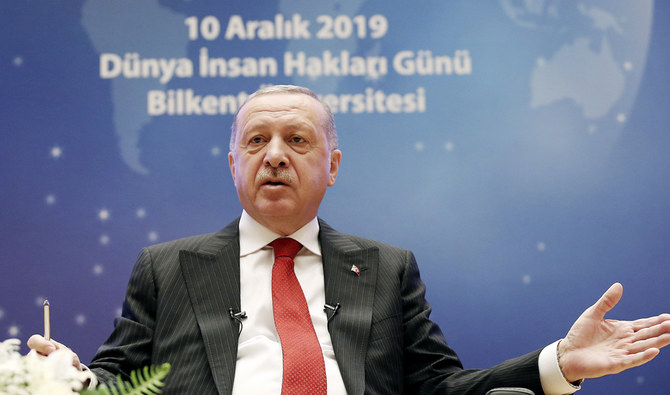ANKARA: Following the meeting of EU foreign ministers on Monday over the maritime delimitation agreement between Turkey and Libya, Turkey is trying to use other leverage to get support for its claims in the region as Brussels expressed solidarity toward its members, Greece and Cyprus.
On Tuesday, Turkish President Recep Tayyip Erdogan is set to talk with his Russian counterpart Vladimir Putin on phone over the latest developments in Libya and the situation of Libyan National Army Field Marshal Khalifa Haftar because he said the country risks turning into “another Syria.”
However, Moscow and Ankara are falling increasingly on opposite sides in Libya. On Nov. 27, Russian Foreign Ministry spokeswoman Maria Zakharova said that the deal between Turkey and the Government of National Accord of Libya (GNA) “gave rise to claims about Turkey’s attempts to legalize its military support for the government in Tripoli, including by way of a blatant violation of the arms embargo.”
In an interview with state-run TRT on Monday evening, Erdogan also announced the likelihood of a joint hydrocarbon exploration between Turkey and the GNA after both sides ratify the controversial deal on maritime boundaries that allegedly challenges Greek sovereignty.
He also said Turkey may send troops to Libya, if the GNA request them.
Dimitar Bechev, a nonresident senior fellow at the Atlantic Councils’s Eurasia Center, doubts that Erdogan will get full support from Putin for his Libya cause. “Russia’s main focus now is Syria,” he told Arab News.
On Dec. 8, Commander of Libya’s Navy Admiral Faraj Al-Mahdawi, who studied at the Hellenic Naval Academy — like many other Libyan naval officers — promised to set Tripoli free and to demolish Turkey’s dreams.
While the EU’s meeting of foreign ministers was being held, an Italian naval frigate surprisingly docked in Larnaca, Cyprus, as a sign of collaboration. This was the third Italian naval visit in the last couple of months.
In his interview, Erdogan said that Turkey would get a new drilling ship to continue its activities in the Eastern Mediterranean, adding that the country’s operations may extend to the Black Sea or international waters.
But he claimed that “other international actors cannot conduct exploration operations in these areas Turkey depicted with this accord without getting permission. Greek Cyprus, Egypt, Greece and Israel cannot launch a gas transmission line without first receiving permission from Turkey.”
According to this perspective, the deal with the GNA gives the green light to Turkey for carrying out drilling on Libya’s continental shelf with Tripoli’s approval.
Despite being NATO allies, Greece and Turkey are two neighbors divided by a several decades-old problems. They have come to the brink of war several times, and have clashing over drilling rights and some disputed islets in the Aegean.
Erdogan termed Greece’s expulsion of the Libyan envoy an “international scandal” and said Athens will pay the price for its actions internationally.
As a retaliation to Turkey’s activities in the Eastern Mediterranean, the EU has recently halted talks on air transport agreement and urged the European Investment Bank to review its lending scheme to the country, which started accession negotiations in 2005.
Brussels also warned that additional “targeted measures” could be put on the agenda to further punish Ankara over its “illegal” maritime activities.
“A Memorandum of Understanding (MoU) ostensibly delineating maritime borders between Turkey and Libya causes serious concern,” EU foreign policy chief Josep Borrell told reporters after the EU meeting on Monday.
In a surprise move on Tuesday, Greece, defining the Turkey-Libya maritime deal as a threat to regional stability, lodged objections with the UN regarding the deal.
However, as Turkey is not party to the United Nations Convention on the Law of the Sea (UNCLOS), this mechanism could be a symbolic attempt to draw the attention of the international community.
Gabriel Mitchell, an expert on energy and Eastern Mediterranean from Virginia Tech University, thinks the UN may deliver statements about the Turkey-Libya maritime deal.
“Turkey will likely ignore an international legal decision on the matter. Over the last decade, Turkey has not been a participant in regional energy and maritime initiatives. Because it has not received an invitation, Ankara hopes to use this MoU as a means to forcibly reenter Eastern Mediterranean geopolitics,” he told Arab News.
According to Mitchell, even the notion of Turkey sending troops to Libya will draw strong warnings from many in the international community, including NATO member states.













